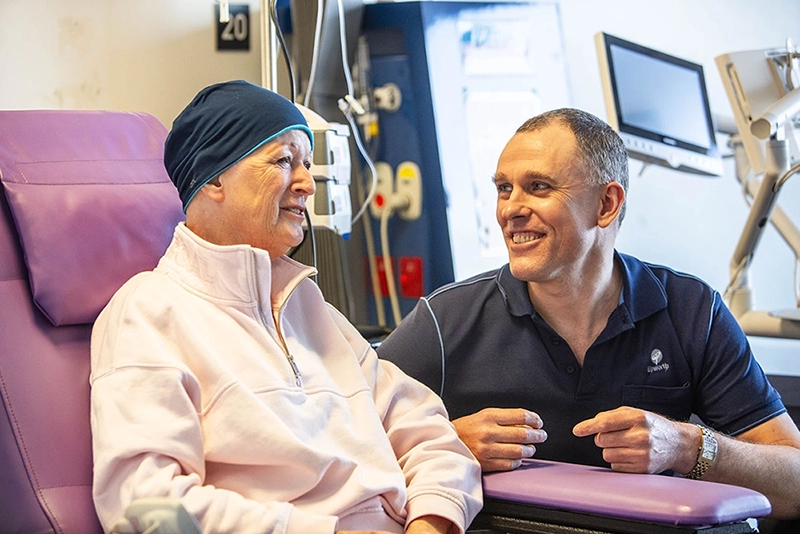عرض هذه الصفحة باللغة العربية
Chemotherapy - Arabic
查看此页面的简体中文版本
Chemotherapy - Mandarin
Xem trang này bằng tiếng Việt
Chemotherapy - Vietnamese
Chemotherapy
Chemotherapy is one of the main treatments used to treat pancreatic cancer. It involves using drugs to kill cancer cells in your body. Chemotherapy can also damage healthy cells which often causes the side effects of chemotherapy.
Depending on your treatment plan, you may receive chemotherapy on its own, or in conjunction with radiotherapy and/or surgery. Your treatment plan will depend on the stage of your cancer.
Chemotherapy can be prescribed with different treatment goals. Your doctor may recommend chemotherapy to:
- shrink your tumour before surgery for a better chance of removal (called neo-adjuvant chemotherapy)
- destroy any remaining cancer cells after surgery to help prevent the cancer from returning (called adjuvant chemotherapy)
- when surgery is not an option, it can slow down the cancer growth.
Chemotherapy is generally administered through a drip (intravenously) into the veins. Some chemotherapy medicines also come in tablet form.
Before chemotherapy, your medical oncology team will provide you with detailed information on your chemotherapy drugs and common side effects based on your individual treatment plan. This will include information on preparing for chemotherapy, what to expect after and how to best manage side effects.
Watch: Chemotherapy and radiation therapy for pancreatic cancer | Patient education video
What to expect: Chemotherapy for pancreatic cancer
Side effects of chemotherapy
Most chemotherapy drugs work to kill fast-growing cells (e.g. cancer cells). They may also affect other types of fast-growing cells such as cells in the bone marrow, gastrointestinal tract, skin, hair and nails. This leads to common side effects of chemotherapy, including:
- nausea and vomiting
- hair loss
- skin and nail changes
- mouth sores
- changes in appetite, taste, and smell
- increased risk of infections (due to reduced white blood cell counts)
- bruising or bleeding more easily (from low platelet counts)
- anaemia (low red blood cell counts) leading to tiredness and shortness of breath.
Certain chemotherapy drugs can lead to specific long-term effects on the heart, kidneys and other organs, as well as fertility issues. The intensity and type of side effects vary widely among individuals and depend on the specific drugs used, the dosage and duration of treatment.
Treatments for pancreatic cancer may also cause changes in how your pancreas works. As a result of these changes, you may experience the following symptoms:
- nausea and vomiting
- diarrhoea
- no appetite
- changes in bowel habits
- heartburn or indigestion
- feeling full quickly after eating (early satiety).
Before you start chemotherapy, your doctor will discuss your treatment options with you and the potential side effects of your specific treatment. If you start to experience any side effects, notify your healthcare team immediately so they can be managed effectively and as soon as possible.
Read more about other treatments

